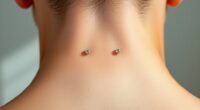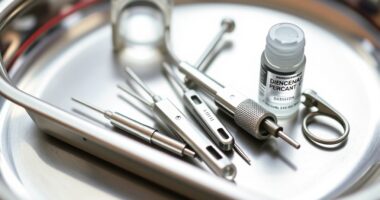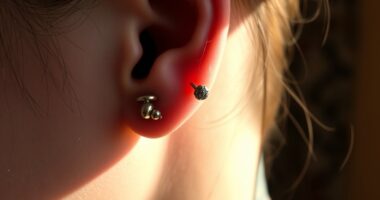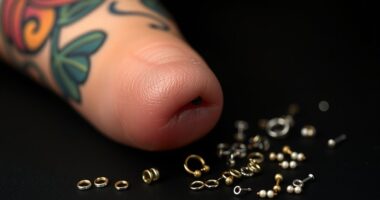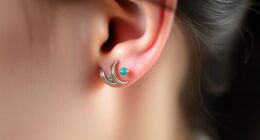To prepare mentally and physically for a piercing, start by discussing your expectations and any concerns with your piercer to build confidence. Stay well-hydrated, avoid alcohol or blood-thinning medications beforehand, and consider applying a cold pack to numb the area. Practice deep breathing or visualization techniques to reduce anxiety. Wearing loose clothing prevents irritation, and remembering proper aftercare will help your healing process go smoothly. Keep going to discover more helpful tips to ensure a positive experience.
Key Takeaways
- Research the piercing procedure and ask your piercer any questions to reduce anxiety.
- Practice deep breathing or distraction techniques to stay relaxed before and during the appointment.
- Prepare your body by staying hydrated, eating well, and avoiding alcohol or blood-thinning medications beforehand.
- Follow the piercer’s instructions on pain management, such as applying a cold pack or taking OTC pain relievers if suitable.
- Stock up on recommended aftercare products and plan for proper cleaning routines during healing.
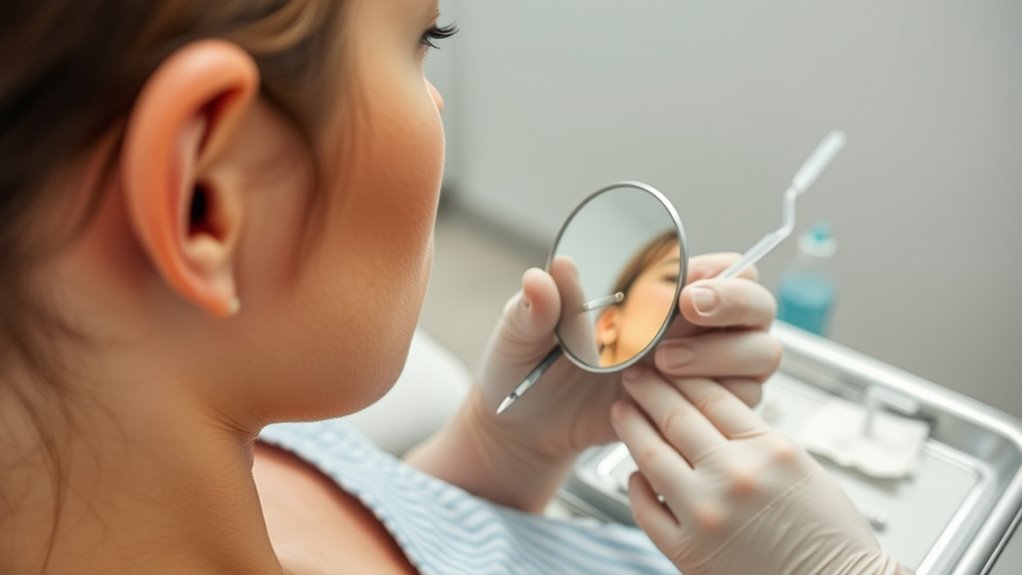
Getting a piercing can be an exciting experience, but preparing yourself both mentally and physically is vital for a smooth process. The more you plan ahead, the less anxiety you’ll feel and the better your healing experience will be. One of the most important aspects is understanding pain management. While everyone’s pain tolerance varies, knowing what to expect can help you stay calm. Talk to your piercer about what sensations you might experience during the procedure. Some discomfort is normal, but it shouldn’t be overwhelming. You can also consider taking over-the-counter pain relievers beforehand, but check with your piercer or healthcare provider first. Applying a cold pack to the area immediately before the piercing can help numb the skin slightly, reducing pain and swelling. Following your piercer’s advice on pain management is essential to guarantee a comfortable experience. Using appropriate aftercare products is also crucial for proper healing. Preparing your body for a piercing also means focusing on your aftercare routines. Proper aftercare isn’t just about keeping the piercing clean; it’s about promoting healing and preventing infection. Before your appointment, stock up on recommended products like saline solutions or gentle cleansers, and avoid using harsh chemicals or alcohol-based products. During the healing process, you’ll need to be diligent with your aftercare routines—clean the piercing twice daily, avoid touching it with unwashed hands, and steer clear of irritating substances like makeup or hair products. Wearing loose clothing can help prevent unnecessary pressure or irritation on the new piercing. Staying hydrated and maintaining a healthy diet also support your body’s natural healing process, making the recovery smoother. Mentally, it’s important to set realistic expectations. Understand that some discomfort, swelling, or redness is normal initially. If you feel anxious, try deep breathing exercises or distraction techniques to stay calm. Visualize the process positively—focusing on the end goal of having a beautiful, fresh piercing can boost your confidence. Remember, your piercer is there to guide you every step of the way. Don’t hesitate to ask questions or express concerns beforehand. Being well-informed reduces anxiety and helps you better follow the aftercare routines. Trusting your piercer’s expertise and committing to proper pain management strategies makes the entire experience more manageable.
Frequently Asked Questions
How Long Does the Healing Process Typically Take?
The healing process for a piercing generally takes about 6 to 8 weeks, but it varies depending on the piercing type and your aftercare. Expect some piercing pain during healing, which is normal. You should follow your piercer’s advice to guarantee a smooth recovery and avoid complications. Keep the area clean, avoid touching it unnecessarily, and be patient with the healing timeline to achieve the best results.
Are There Specific Foods to Avoid Before Getting Pierced?
Think of your body as a garden needing care. Before your piercing, avoid foods that can cause inflammation or slow healing, like spicy dishes, alcohol, and caffeine. These act like weeds, hindering your piercing aftercare. Stick to nourishing, gentle foods to help your body heal smoothly. Proper dietary restrictions support quicker recovery and minimize complications, making your piercing journey a flourishing one.
What Are the Signs of an Infected Piercing?
You should watch for signs of infection like increased redness, swelling, pain, or pus around your piercing. Symptoms to watch for include warmth, a foul odor, or excessive tenderness that persists. If you notice these signs of infection, it’s essential to seek medical attention promptly. Ignoring them could lead to complications, so stay alert for any unusual changes and follow aftercare instructions carefully to promote healing.
Can I Exercise Immediately After Getting Pierced?
Think of your piercing as a delicate seed that needs time to grow. You shouldn’t exercise immediately after getting pierced because of post piercing soreness and the risk of irritation. Strenuous activity can cause swelling, slow healing, and increase infection chances. Instead, give your body a few days to rest, follow exercise precautions, and gradually ease back into your routine to protect your new piercing.
How Should I Care for My Piercing During Outdoor Activities?
During outdoor activities, you should prioritize piercing aftercare by keeping the area clean and protected from dirt and sweat. Use a saline solution to gently clean your piercing regularly and avoid touching it with dirty hands. Wear loose, breathable clothing if applicable, and try to stay in shaded areas to prevent irritation. Follow these outdoor activity tips to promote healing and prevent infections, ensuring your piercing remains healthy and beautiful.
Conclusion
Now that you’re prepared mentally and physically, you’re unstoppable. With the right mindset and care, you’ll conquer this piercing like a warrior entering battle. Nothing can stop you—your courage and readiness are now legendary. Remember, this isn’t just a piercing; it’s a bold statement of your strength and confidence. So go ahead, take that leap, and show the world the fearless, unstoppable you!


